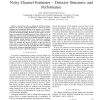Free Online Productivity Tools
i2Speak
i2Symbol
i2OCR
iTex2Img
iWeb2Print
iWeb2Shot
i2Type
iPdf2Split
iPdf2Merge
i2Bopomofo
i2Arabic
i2Style
i2Image
i2PDF
iLatex2Rtf
Sci2ools
VTC
2008
IEEE
2008
IEEE
Binary Demodulation in Rayleigh Fading with Noisy Channel Estimates - Detector Structures and Performance
Abstract— In previous work, we studied the structure and performance of optimum maximum-likelihood receivers for binary antipodal and orthogonal signals in the presence of Gaussiandistributed channel estimation error and additive white Gaussian noise for flat Rayleigh fading channels. In this paper, we investigate the structure and performance of these receivers for an application where Gaussian-distributed channel estimation error arises: minimum mean-square error channel estimation in quasistatic Rayleigh fading channels. Exact closed-form analytical expressions are derived for the average bit error probability (BEP). We quantify the impact of number of pilot symbols in each frame as well as the ratio of the power of the pilot symbol to the power of data on the average BEP. We derive conditions under which orthogonal signalling results in a lower average BEP compared with binary antipodal signalling.
| Added | 01 Jun 2010 |
| Updated | 01 Jun 2010 |
| Type | Conference |
| Year | 2008 |
| Where | VTC |
| Authors | Amir Ali Basri, Teng Joon Lim |
Comments (0)

